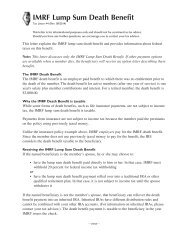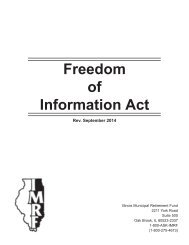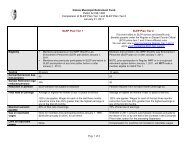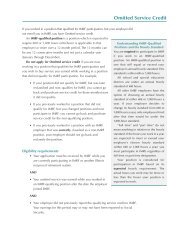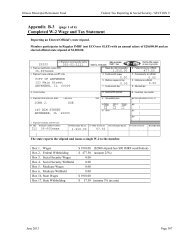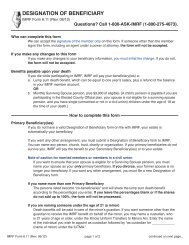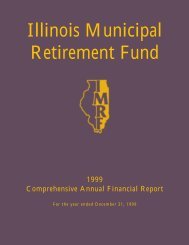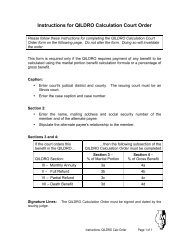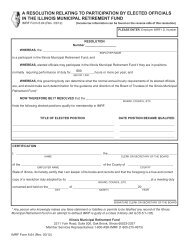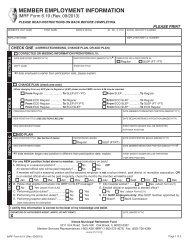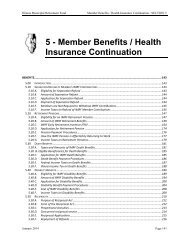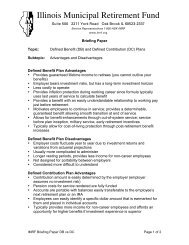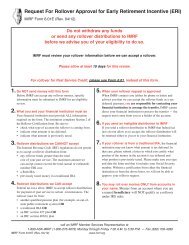Section 6 - IMRF
Section 6 - IMRF
Section 6 - IMRF
Create successful ePaper yourself
Turn your PDF publications into a flip-book with our unique Google optimized e-Paper software.
Exhibit 6O<br />
Conditions of <strong>IMRF</strong> Designation of Beneficiary<br />
Page 4 of 4<br />
This is a brief summary of your <strong>IMRF</strong> death benefit provisions.<br />
Your rights and obligations as an <strong>IMRF</strong> member are governed by Article 7 of the Illinois Pension Code.<br />
This designation of beneficiary:<br />
• Provides for payment of <strong>IMRF</strong> death benefits and<br />
revokes (cancels) any prior beneficiary designation.<br />
• Will be effective when you sign it and it is on file in<br />
<strong>IMRF</strong>’s Oak Brook or Springfield office.<br />
• Is subject to Illinois law and to rules and regulations<br />
established by the <strong>IMRF</strong> Board of Trustees.<br />
The acceptance of this designation by <strong>IMRF</strong> does not mean<br />
that a death benefit will be payable if you are not otherwise<br />
entitled to one. Whether a benefit is payable, and the amount<br />
paid, will be determined at the time of death under applicable<br />
laws and regulations.<br />
You cannot name a creditor (such as a bank, credit union,<br />
or loan company) as your beneficiary as a means of providing<br />
security for a debt.<br />
Benefits payable<br />
• Lump sum death benefit OR<br />
• Surviving Spouse pension<br />
• Child’s pension<br />
A child’s pension is payable if the member was<br />
participating in the Elected County Official Plan and the<br />
member’s spouse is not eligible for a surviving spouse<br />
pension, but the deceased children who are unmarried/<br />
not in a civil union, under the age of 18.<br />
Surviving spouse pension<br />
If you want your spouse to be eligible for a Surviving<br />
Spouse pension, you must name your spouse as your only<br />
Primary Beneficiary.<br />
If your spouse is not your only Primary Beneficiary,<br />
• the right to a Surviving Spouse pension is<br />
forfeited (lost).<br />
• only a lump sum benefit is payable (which<br />
can be equal to one year’s salary, plus a refund<br />
of the balance in your <strong>IMRF</strong> member account).<br />
In the case of the member with many years<br />
of service credit, the forfeited Surviving<br />
Spouse pension may be of greater value<br />
than the lump sum benefit.<br />
Naming a minor(s) as beneficiary(ies)<br />
Death benefits payable to a minor (under the age of 21) are<br />
paid in care of the minor’s guardian.<br />
If you want someone other than the minor’s guardian to<br />
receive the <strong>IMRF</strong> benefit on behalf of the minor, you may name<br />
a custodian (who is 21 years of age or older) under the Illinois<br />
Uniform Transfers to Minors Act.<br />
This is done by entering the name of the individual you<br />
wish to appoint as custodian followed by “as custodian for<br />
__________(name of minor) under the IUTMA.”<br />
Shares to each named beneficiary<br />
You must write in specific shares (percentages), if<br />
naming more than one beneficiary. These shares MUST<br />
add up to 100% or the form will not be processed.<br />
If a named beneficiary does not survive, his or her shares<br />
will be distributed among any surviving beneficiaries. However,<br />
if you want his or her shares to be distributed to his or her<br />
heirs by blood line (not a spouse), add “per stirpes” after the<br />
beneficiary’s name.<br />
Death benefit payments<br />
<strong>IMRF</strong> death benefits are paid to your:<br />
• Primary Beneficiary you designated on your most<br />
recent valid designation of beneficiary form on file with<br />
<strong>IMRF</strong>.<br />
• Estate if you have no valid designation form on file.<br />
If none of your Primary Beneficiary(ies) survives, the<br />
benefit will be paid to your Secondary Beneficiary(ies).<br />
If none of your Primary or Secondary Beneficiary(ies)<br />
survives, the benefit will be paid to your estate.<br />
If you divorce<br />
If you named your spouse as a your primary beneficiary<br />
but you later divorce, your former spouse is no longer your<br />
beneficiary. If you want any other arrangement, you must file a<br />
new Designation of Beneficiary form.



